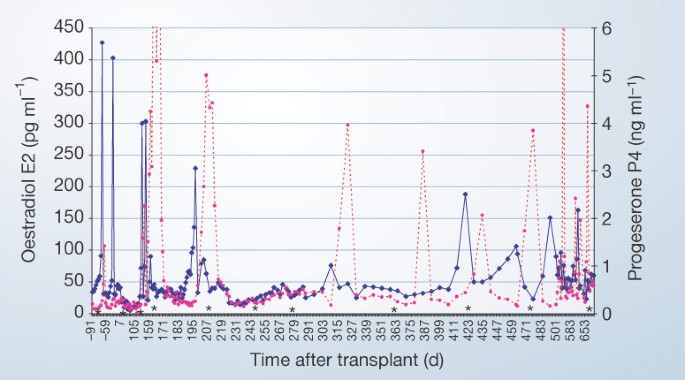
Live birth after ovarian tissue transplant
- Select a language for the TTS:
- UK English Female
- UK English Male
- US English Female
- US English Male
- Australian Female
- Australian Male
- Language selected: (auto detect) - EN
Play all audios:

Fresh pieces of monkey ovary remain fully functional even when moved to a new site. ABSTRACT Radiation and high-dose chemotherapy may render women with cancer prematurely sterile, a
side-effect that would be avoided if ovarian tissue that had been removed before treatment could be made to function afterwards. Live offspring have been produced from transplanted ovarian
tissue in mice1 and sheep2 but not in monkeys3 or humans4,5, although sex steroid hormones are still secreted. Here we describe the successful transplantation of fresh ovarian tissue to a
different site in a monkey, which has led to the birth of a healthy female after oocyte production, fertilization and transfer to a surrogate mother. The ectopically grafted tissue functions
without surgical connection to major blood vessels and sets the stage for the transplantation of cryopreserved ovarian tissue in humans. Access through your institution Buy or subscribe
This is a preview of subscription content, access via your institution ACCESS OPTIONS Access through your institution Subscribe to this journal Receive 51 print issues and online access
$199.00 per year only $3.90 per issue Learn more Buy this article * Purchase on SpringerLink * Instant access to full article PDF Buy now Prices may be subject to local taxes which are
calculated during checkout ADDITIONAL ACCESS OPTIONS: * Log in * Learn about institutional subscriptions * Read our FAQs * Contact customer support SIMILAR CONTENT BEING VIEWED BY OTHERS
OVARIAN CRYOPRESERVATION WITH RAPAMYCIN IMPROVES FERTILITY RESTORATION IN A MURINE ORTHOTOPIC TRANSPLANTATION MODEL Article Open access 19 March 2025 THE EFFECT OF HEMATOPOIETIC STEM CELL
TRANSPLANTATION ON FERTILITY AND STRATEGIES FOR IMPROVEMENT Article 29 August 2022 ALLOGENEIC OVARIAN TRANSPLANTATION PROMOTES THE RECOVERY OF OVARIAN FUNCTION IN A RAT MODEL OF
CISPLATIN-INDUCED PREMATURE OVARIAN FAILURE Article Open access 19 March 2025 REFERENCES * Parrott, D. M. _J. Reprod. Fertil._ 1, 230–241 (1960). Article Google Scholar * Gosden, R. G.,
Baird, D. T., Wade, J. C. & Webb, R. _Hum. Reprod._ 9, 597–603 (1994). Article CAS Google Scholar * Schnorr, J. et al. _Hum. Reprod._ 17, 612–619 (2002). Article Google Scholar * Le
Porrier, M., von Theobold, P., Roffe, J. L. & Muller, G. _Cancer_ 60, 2201–2204 (1987). Article CAS Google Scholar * Oktay, K. et al. _J. Am. Med. Assoc._ 286, 1490–1493 (2001).
Article CAS Google Scholar * Duffy, D. M. & Stouffer, R. L. _Hum. Reprod._ 17, 2825–2831 (2002). Article CAS Google Scholar * Ouhibi, N., Zelinski-Wooten, M. B., Thomson, J. A.
& Wolf, D. P. in _Contemporary Endocrinology: Assisted Fertilization and Nuclear Transfer in Mammals_ (eds Wolf, D. P. & Zelinski-Wooten, M. B.) 253–284 (Humana, Totowa, New Jersey,
2001) Book Google Scholar * Lutjen, P. et al. _Nature_ 307, 174–175 (1984). Article ADS CAS Google Scholar Download references AUTHOR INFORMATION AUTHORS AND AFFILIATIONS * Department
of Obstetrics and Gynecology, Division of Reproductive Sciences, Oregon Health & Science University, Pediatrics, Physiology and Pharmacology, Oregon National Primate Research Center,
Portland, 97201, Oregon, USA D. M. Lee, R. R. Yeoman, D. E. Battaglia, R. L. Stouffer, M. B. Zelinski-Wooten, J. W. Fanton & D. P. Wolf Authors * D. M. Lee View author publications You
can also search for this author inPubMed Google Scholar * R. R. Yeoman View author publications You can also search for this author inPubMed Google Scholar * D. E. Battaglia View author
publications You can also search for this author inPubMed Google Scholar * R. L. Stouffer View author publications You can also search for this author inPubMed Google Scholar * M. B.
Zelinski-Wooten View author publications You can also search for this author inPubMed Google Scholar * J. W. Fanton View author publications You can also search for this author inPubMed
Google Scholar * D. P. Wolf View author publications You can also search for this author inPubMed Google Scholar CORRESPONDING AUTHOR Correspondence to D. M. Lee. ETHICS DECLARATIONS
COMPETING INTERESTS The authors declare no competing financial interests. SUPPLEMENTARY INFORMATION SUPPLEMENTARY FIGURE a) Ovarian cortical tissue prepared for transplantation; b)
Transplantation to 3 mm subcutaneous pockets in the arm and abdomen. Ovarian tissue was placed with the cortex against the underlying muscle; c) Development of a follicle from fresh ovarian
tissue transplanted to the forearm. The inset shows the ultrasonographic appearance of the follicle. Oestradiol increased from 72 pg/ml to 575 pg/ml in venous blood from the transplanted
tissue. Progesterone also increased from 0.24 ng/ml to 1.82 ng/ml. (JPG 34 kb) SUPPLEMENTARY TABLE Follicular development, oocyte procurement, and fertilization by transplantation site. (DOC
43 kb) RIGHTS AND PERMISSIONS Reprints and permissions ABOUT THIS ARTICLE CITE THIS ARTICLE Lee, D., Yeoman, R., Battaglia, D. _et al._ Live birth after ovarian tissue transplant. _Nature_
428, 137–138 (2004). https://doi.org/10.1038/428137a Download citation * Issue Date: 11 March 2004 * DOI: https://doi.org/10.1038/428137a SHARE THIS ARTICLE Anyone you share the following
link with will be able to read this content: Get shareable link Sorry, a shareable link is not currently available for this article. Copy to clipboard Provided by the Springer Nature
SharedIt content-sharing initiative
